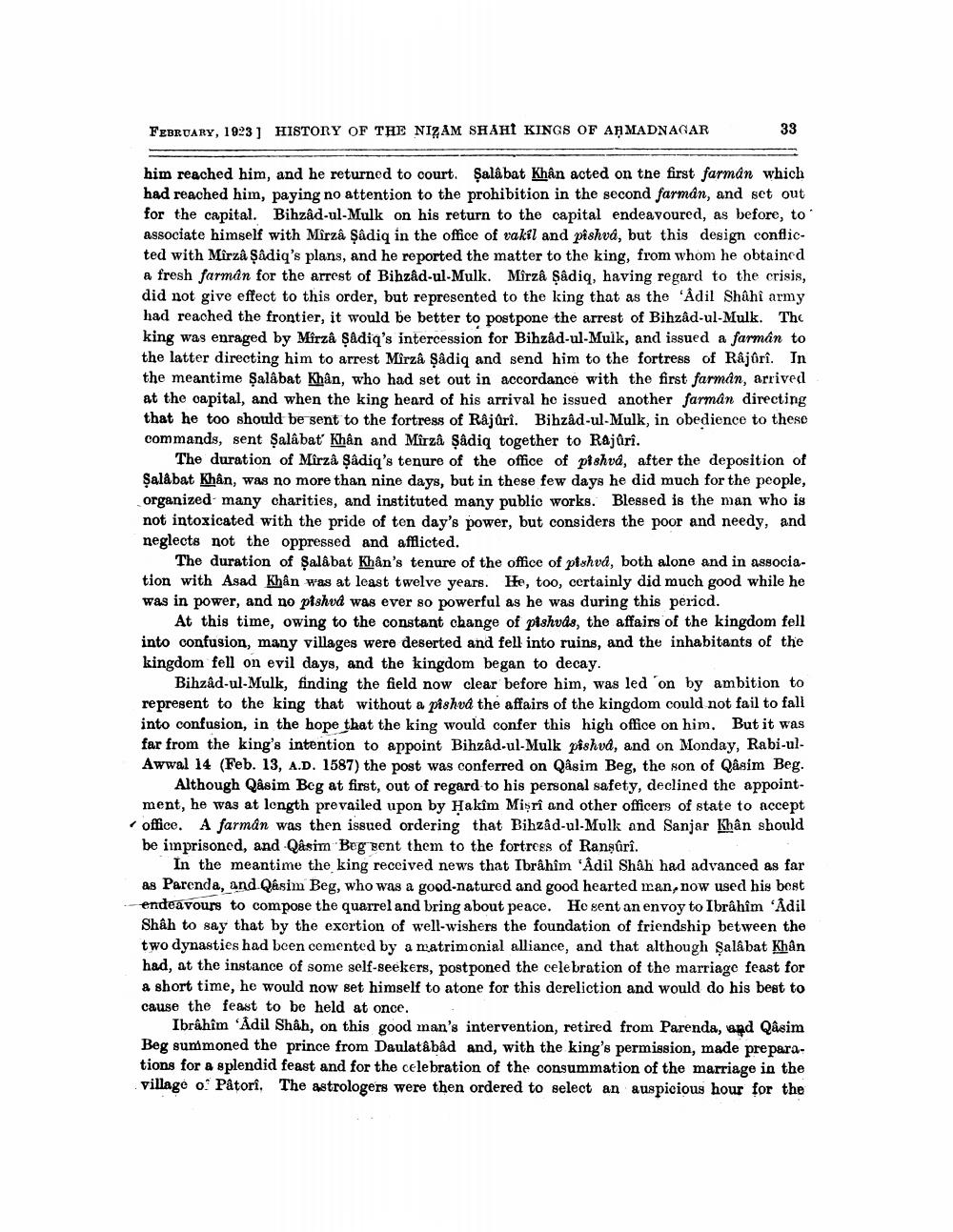________________
FEBRUARY, 1923] HISTORY OF THE NIZAM SHAH KINGS OF AHMADNAGAR
33
him reached him, and he returned to court. Salâ bat Khân acted on the first farmán which had reached him, paying no attention to the prohibition in the second farmán, and set out for the capital. Bihzâd-ul-Mulk on his return to the capital endeavoured, as before, to associate himself with Mirza Şadiq in the office of vakil and pishva, but this design conflicted with Mirza Şadiq's plans, and he reported the matter to the king, from whom he obtained a fresh farmán for the arrest of Bihzâd-ul-Mulk. Mîrzâ şâdiq, having regard to the crisis, did not give effect to this order, but represented to the king that as the 'Adil Shâhî army had reached the frontier, it would be better to postpone the arrest of Bihzâd-ul-Mulk. The king was enraged by Mirza sadiq's intercession for Bihzâd-ul-Mulk, and issued a farmôn to the latter directing him to arrest Mirza şådiq and send him to the fortress of Råjûrî. In the meantime Salábat Khân, who had set out in accordance with the first farman, arrived at the oapital, and when the king heard of his arrival ho issued another farmân directing that he too should be sent to the fortress of Rajûrî. Bihzâd-ul-Mulk, in obedience to these commands, sent Salábat Khân and Mirza Sadiq together to Rajúri.
The duration of Mirza Sadiq's tenure of the office of pishvd, after the deposition of Şalábat Khân, was no more than nine days, but in these few days he did much for the people, organized many charities, and instituted many public works. Blessed is the man who is not intoxicated with the pride of ten day's power, but considers the poor and needy, and neglects not the oppressed and afflicted.
The duration of Salâ bat Khan's tenure of the office of pishvd, both alone and in association with Asad Khân was at least twelve years. He, too, certainly did much good while he was in power, and no ptshvd was ever so powerful as he was during this period.
At this time, owing to the constant change of pishvds, the affairs of the kingdom fell into confusion, many villages were deserted and fell into ruins, and the inhabitants of the kingdom fell on evil days, and the kingdom began to decay.
Bihzâd-ul-Mulk, finding the field now clear before him, was led on by ambition to represent to the king that without a pishva the affairs of the kingdom could not fail to fall into confusion, in the hope that the king would confer this high office on him. But it was far from the king's intention to appoint Bihzâd-ul-Mulk pishva, and on Monday, Rabi-ulAwwal 14 (Feb. 13, A.D. 1587) the post was conferred on Qasim Beg, the son of Qasim Beg.
Although Qasim Beg at first, out of regard to his personal safety, declined the appointment, he was at length prevailed upon by Hakim Misri and other officers of state to accept office. A farman was then issued ordering that Bihzâd-ul-Mulk and Sanjar Khân should be imprisoned, and Qasim Beg sent them to the fortrees of Ranşûrî.
In the meantime the king received news that Ibrâhîm 'Adil Shah had advanced as far as Parenda, and Qasim Beg, who was a good-natured and good hearted ran, now used his best endeavours to compose the quarrel and bring about peace. He sent an envoy to Ibrâhîm 'Adil Shah to say that by the exortion of well-wishers the foundation of friendship between the two dynasties had been comented by a matrimonial alliance, and that although Şalâ bat Khân had, at the instance of some self-seekers, postponed the celebration of the marriage feast for a short time, he would now set himself to atone for this dereliction and would do his best to cause the feast to be held at once. .
Ibrahim Adil Shah, on this good man's intervention, retired from Parenda, and Qasim Beg summoned the prince from Daulatâbâd and, with the king's permission, made preparations for a splendid feast and for the celebration of the consummation of the marriage in the village o. Påtori. The astrologers were then ordered to select an auspicious hour for the




